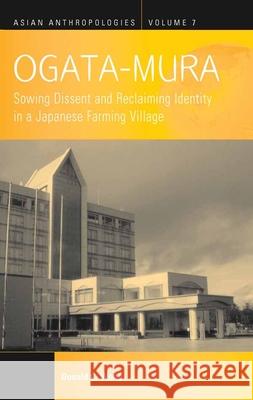Ogata-Mura: Sowing Dissent and Reclaiming Identity in a Japanese Farming Village » książka
Ogata-Mura: Sowing Dissent and Reclaiming Identity in a Japanese Farming Village
ISBN-13: 9781785330445 / Angielski / Miękka / 2015 / 262 str.
Ogata-Mura: Sowing Dissent and Reclaiming Identity in a Japanese Farming Village
ISBN-13: 9781785330445 / Angielski / Miękka / 2015 / 262 str.
(netto: 129,05 VAT: 5%)
Najniższa cena z 30 dni: 134,94
ok. 30 dni roboczych
Bez gwarancji dostawy przed świętami
Darmowa dostawa!
"In his densely detailed, long-term study of Ogata-mura, Wood has taken us a lifetime away from the first studies of Japanese villages carried out by foreigners in the 1930s and 1950s... Wood presents an excellent analysis of the conflict between the view held by some residents that farming is a way of life and the conviction by others that it is a business like any other. The authorities have proved remarkably tone-deaf to the implications of this contrast, not only in Ogata-mura, but on the national level as well. Wood is able to provide a degree of detail that most ethnographers would envy." - Asian Anthropology "This is a very interesting text written about a very important subject. The 'saga' of Ogata-mura speaks to a number of issues (agriculture, rural development, centralized bureaucratic planning, ecological impact and other such areas) that are very important for modern Japan and, by extension, many other societies." - John Mock, Temple University Japan Following the Second World War, a massive land reclamation project to boost Japan's rice production capacity led to the transformation of the shallow lagoon of Hachirogata in Akita Prefecture into a seventeen-thousand-hectare expanse of farmland. In 1964, the village of Ogata-mura was founded on the empoldered land inside the lagoon and nearly six hundred pioneers from across the country were brought to settle there. The village was to be a model of a new breed of highly mechanized, efficient rice agriculture; however, the village's purpose was jeopardized when the demand for rice fell, and the goal of creating an egalitarian farming community was threatened as individual entrepreneurialism took root and as the settlers became divided into political factions that to this day continue to struggle for control of the village. Based on seventeen years of research, this book explores the process of Ogatamura's development from the planning stages to the present. An intensive ethnographic study of the relationship between land reclamation, agriculture, and politics in regional Japan, it traces the internal social effects of the village's economic transformations while addressing the implications of national policy at the municipal and regional levels. Donald C. Wood is an Associate Professor at Akita University, where he has worked since earning a PhD in cultural anthropology at the University of Tokyo in 2004. He is currently editor of the Research in Economic Anthropology book series.
"In his densely detailed, long-term study of Ogata-mura, Wood has taken us a lifetime away from the first studies of Japanese villages carried out by foreigners in the 1930s and 1950s... Wood presents an excellent analysis of the conflict between the view held by some residents that farming is a way of life and the conviction by others that it is a business like any other. The authorities have proved remarkably tone-deaf to the implications of this contrast, not only in Ogata-mura, but on the national level as well. Wood is able to provide a degree of detail that most ethnographers would envy." · Asian Anthropology"This is a very interesting text written about a very important subject. The saga of Ogata-mura speaks to a number of issues (agriculture, rural development, centralized bureaucratic planning, ecological impact and other such areas) that are very important for modern Japan and, by extension, many other societies." · John Mock, Temple University JapanFollowing the Second World War, a massive land reclamation project to boost Japans rice production capacity led to the transformation of the shallow lagoon of Hachirogata in Akita Prefecture into a seventeen-thousand-hectare expanse of farmland. In 1964, the village of Ogata-mura was founded on the empoldered land inside the lagoon and nearly six hundred pioneers from across the country were brought to settle there. The village was to be a model of a new breed of highly mechanized, efficient rice agriculture; however, the villages purpose was jeopardized when the demand for rice fell, and the goal of creating an egalitarian farming community was threatened as individual entrepreneurialism took root and as the settlers became divided into political factions that to this day continue to struggle for control of the village. Based on seventeen years of research, this book explores the process of Ogatamuras development from the planning stages to the present. An intensive ethnographic study of the relationship between land reclamation, agriculture, and politics in regional Japan, it traces the internal social effects of the villages economic transformations while addressing the implications of national policy at the municipal and regional levels.Donald C. Wood is an Associate Professor at Akita University, where he has worked since earning a PhD in cultural anthropology at the University of Tokyo in 2004. He is currently editor of the Research in Economic Anthropology book series.











